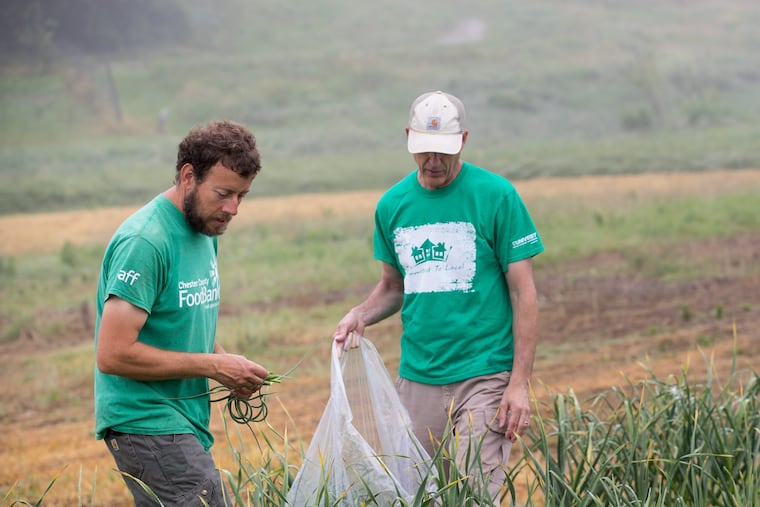In Chesco, volunteer farmers grow food for neighbors in need
Corporate types rotate in and out of the farm to plant and harvest food specifically for county residents in need.

In cool morning fog, bank employees knelt in the mud of a Chester County farm to plant peppers that will feed people living in poverty in the richest county in Pennsylvania.
Office talk died down soon enough, and the only sounds were the wind rippling through still-young corn stalks and the thunk-slide repetition of spades being thrust into dirt.
The farmers for a day — from Univest banking and insurance in Souderton and other locations — were among a legion of volunteers who work on the West Chester farm throughout the growing season for the Chester County Food Bank. The land has been owned by the Quaker-run Westtown School since the 18th century.
Farmer Pete Flynn, who leases 200 acres from Westtown, allows a six- to 10-acre parcel to be used by the food bank free of charge. The food bank — Flynn is a board member — attracts thousands of volunteers a year, many of who are corporate types who rotate in and out of the farm to plant and harvest food, specifically for county residents in need.
Flynn's largesse has its roots in gleaning, a biblical instruction taken from Leviticus that admonishes farmers to leave crops for people in poverty.
Now 60, Flynn started working on the farm when he was 12, taking time out to get a degree in animal husbandry and dairy science from Michigan State University. His parents, civil rights activists who preached social justice, conferred upon Flynn an understanding that even if you work a solitary job in a green field, you're still part of a community that owes the less fortunate your sweat and diligence.
"It's frustrating to live amidst all this wealth and see people hungry," said Flynn, whose county's residents enjoy an annual median household income above $90,000. Referring to Chester County's farmland — said by agriculture scientists at the University of Pennsylvania to be among the most nutrient-rich in America — Flynn added: "Hunger shouldn't happen here, with this soil. We have enough resources to make this problem go away."
>>READ MORE: They overcame: 3 stories of hope from women who'd endured hell
Economists tell us the stock market can reward investors and still leave those in poverty behind. In Chester County, as the overall economy has improved, poverty has risen from 6.5 percent in 2013 to 7 percent today, U.S. census figures show. By comparison, Philadelphia's poverty rate has dipped from 26.3 percent to 25.7 percent during that same period, according to federal data.
High rents, low-paying service-sector jobs, and the unavoidable expense of keeping a car in a place with little available public transportation rank among the reasons poverty persists in Chester County, experts say.
Still, because the county is synonymous with pastoral beauty and gracious living, "it's hard for people who live here to know there's poverty," said Larry Welsch, executive director of the Chester County Food Bank. That's why he's grateful to Flynn for allowing his agency to pull 200,000 pounds of fresh produce a year from the ground to fight hunger and promote health.
"Our focus is not just on feeding people, but on feeding people well," Welsch said. "We don't want to look like some other food banks, the domain of canned corn and peanut butter."
Much of the work of cultivating Flynn's donated parcel falls to Bill Shick, 40, a Downingtown native who once helped carve a farm of sorts out of the sparse dirt on Hunting Park Avenue in Philadelphia for the Share Food Program, a nonprofit that supplies hundreds of food cupboards.
"I joke that I miss the police helicopters," Shick said.
Out on the Westtown land, Shick has more room to operate amid the vegetables, thousands of identical plants lined up in undeviating rows. He's as devoted as Flynn and Welsch to the core mission. "Our goal is non-hunger," he said.
But, he acknowledged: "There will always be hunger. We are here treating the sickness. It's education and jobs that address the root causes of poverty."
Along with planting and harvesting, Shick must also wrangle the volunteers, who may lack agricultural chops but who often compensate with tireless enthusiasm.
"I love volunteering," said Michelle Gazdik, 44, branch manager of the Univest bank in West Chester, as she handled pepper plants with increasing adroitness. "It gets me out of the office for the day.
"And this is what we can do, our little part. I'm pretty proud."
Philadelphia Media Network is one of 19 news organizations producing "Broke in Philly," a collaborative reporting project on solutions to poverty and the city's push toward economic justice. Read more at brokeinphilly.org or follow @BrokeInPhilly.